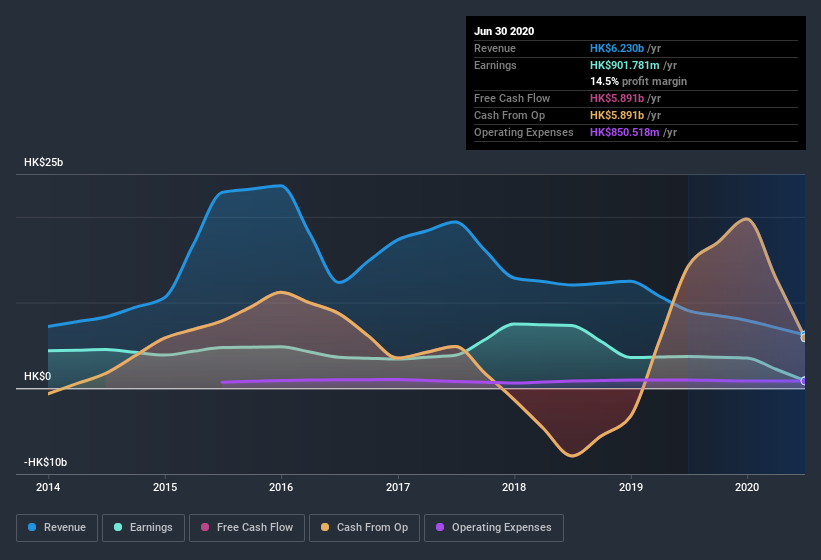- Hong Kong
- /
- Real Estate
- /
- SEHK:247
Here's Why We Think Tsim Sha Tsui Properties's (HKG:247) Statutory Earnings Might Be Conservative

As a general rule, we think profitable companies are less risky than companies that lose money. Having said that, sometimes statutory profit levels are not a good guide to ongoing profitability, because some short term one-off factor has impacted profit levels. In this article, we'll look at how useful this year's statutory profit is, when analysing Tsim Sha Tsui Properties (HKG:247).
While Tsim Sha Tsui Properties was able to generate revenue of HK$6.23b in the last twelve months, we think its profit result of HK$901.8m was more important. Below, you can see that both its revenue and its profit have fallen over the last three years.
View our latest analysis for Tsim Sha Tsui Properties

Not all profits are equal, and we can learn more about the nature of a company's past profitability by diving deeper into the financial statements. This article will focus on the impact unusual items have had on Tsim Sha Tsui Properties' statutory earnings. Our data indicates that Tsim Sha Tsui Properties insiders have been buying shares! If you are like me, that'll make you wonder who exactly bought... and what price they paid! Soclick here to find out (using our intuitive visualisation of insider trading).
The Impact Of Unusual Items On Profit
To properly understand Tsim Sha Tsui Properties' profit results, we need to consider the HK$1.7b expense attributed to unusual items. It's never great to see unusual items costing the company profits, but on the upside, things might improve sooner rather than later. When we analysed the vast majority of listed companies worldwide, we found that significant unusual items are often not repeated. And that's hardly a surprise given these line items are considered unusual. Tsim Sha Tsui Properties took a rather significant hit from unusual items in the year to June 2020. As a result, we can surmise that the unusual items made its statutory profit significantly weaker than it would otherwise be.
Our Take On Tsim Sha Tsui Properties' Profit Performance
As we mentioned previously, the Tsim Sha Tsui Properties' profit was hampered by unusual items in the last year. Based on this observation, we consider it possible that Tsim Sha Tsui Properties' statutory profit actually understates its earnings potential! Unfortunately, though, its earnings per share actually fell back over the last year. At the end of the day, it's essential to consider more than just the factors above, if you want to understand the company properly. With this in mind, we wouldn't consider investing in a stock unless we had a thorough understanding of the risks. For example, we've found that Tsim Sha Tsui Properties has 5 warning signs (1 is significant!) that deserve your attention before going any further with your analysis.
Today we've zoomed in on a single data point to better understand the nature of Tsim Sha Tsui Properties' profit. But there are plenty of other ways to inform your opinion of a company. Some people consider a high return on equity to be a good sign of a quality business. While it might take a little research on your behalf, you may find this free collection of companies boasting high return on equity, or this list of stocks that insiders are buying to be useful.
If you’re looking to trade Tsim Sha Tsui Properties, open an account with the lowest-cost* platform trusted by professionals, Interactive Brokers. Their clients from over 200 countries and territories trade stocks, options, futures, forex, bonds and funds worldwide from a single integrated account. Promoted
Valuation is complex, but we're here to simplify it.
Discover if Tsim Sha Tsui Properties might be undervalued or overvalued with our detailed analysis, featuring fair value estimates, potential risks, dividends, insider trades, and its financial condition.
Access Free AnalysisThis article by Simply Wall St is general in nature. It does not constitute a recommendation to buy or sell any stock, and does not take account of your objectives, or your financial situation. We aim to bring you long-term focused analysis driven by fundamental data. Note that our analysis may not factor in the latest price-sensitive company announcements or qualitative material. Simply Wall St has no position in any stocks mentioned.
*Interactive Brokers Rated Lowest Cost Broker by StockBrokers.com Annual Online Review 2020
Have feedback on this article? Concerned about the content? Get in touch with us directly. Alternatively, email editorial-team (at) simplywallst.com.
About SEHK:247
Tsim Sha Tsui Properties
An investment holding company, invests in, develops, manages, and trades in properties primarily in Hong Kong, Mainland China, Singapore, and Australia.
Excellent balance sheet average dividend payer.
Similar Companies
Market Insights
Community Narratives



